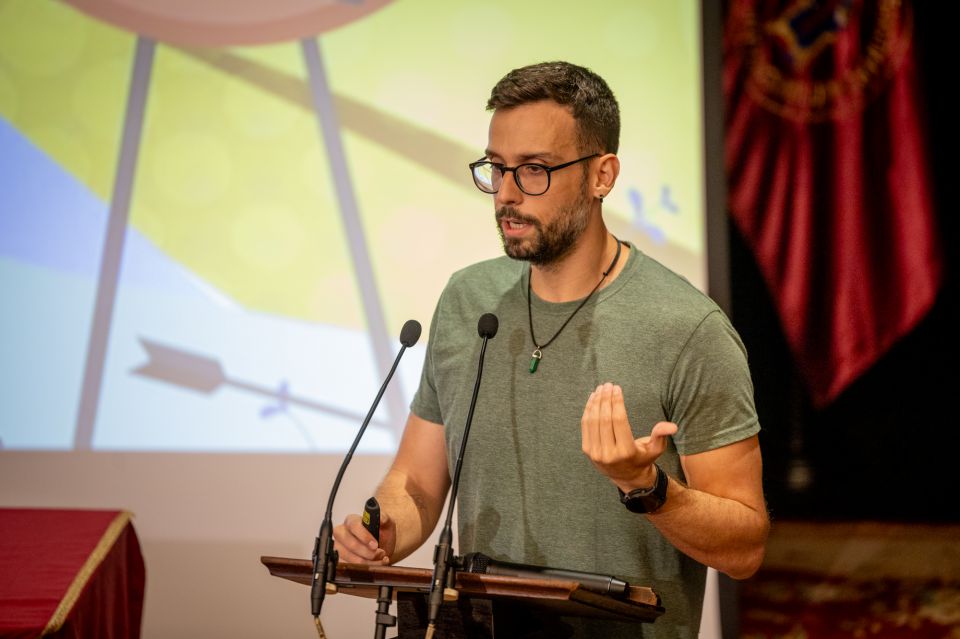
Faustino Afonso, a primary care physician, Paralympic swimmer, and founder of the NGO "Athletes Without Borders," was the keynote speaker today, Friday, 19th July, at the opening of the thirty-first edition of Adeje's Summer University, taking place from the July 22 - 26. In his address he emphasised that in a world that only wants to see the positive and tries to hide the negative, having obstacles in life, such as those he has faced, should be seen as a spur to self-improvement and a fuller life. This message is in line with the theme of this year's summer courses in 2024 - the culture of effort and inclusion.
During the opening ceremony, the rector of the University of La Laguna, Francisco García, recalled attending the first edition of Adeje's Summer University in 1992 as a final-year Economics student. Now, thirty-one years later, he returns as rector. He highlighted the enduring relevance of this educational and cultural programme, the longest-running of its kind in the Canary Islands, attributing its longevity to its ability to adapt to the audience's needs while maintaining its core purpose: providing rigorous academic yet accessible education on socially relevant issues.
García reviewed the diverse topics of this year’s summer university, which include courses and workshops on nutrition, mental health, sustainability, tourism, literature, and communication. He emphasised that this initiative is a prime example of collaboration not only between institutions but also between public and private sectors, thanks to the support of numerous companies. Recalling that yesterday, 18th July, was Mandela Day, he concluded his speech with a quote from the former South African president: "Education is the most powerful weapon you can use to change the world."
Continuing in this vein of gratitude for the support that makes these summer courses possible, the mayor of Adeje, José Miguel Rodríguez Fraga, highlighted the support from the Tenerife Cabildo for the first time, thanking the Tenerife councillor for Employment, Education, and Youth, Efraín Medina, who was present at the event. The municipal leader described the Adeje Summer University as a "bridge offer" between two realities that have shaped the municipality: tourism development, which has become the main source of wealth for the area and a topic for discussion regarding its potential, and the need to incorporate knowledge and talent into the value chain of this resource.
Reflecting on this year's motto, the mayor cited the Adeje Summer University as an example of perseverance and effort, noting that in its thirty years, it has overcome some initial doubts about its viability to become a well-established academic fixture. He also mentioned that the creation of these summer courses significantly increased university enrolment among young people in Adeje, at a time when the abundance of tourism jobs made higher education less attractive. "It is important that we continue to advance on this path because we have growth prospects."
The Culture of Perseverance
Faustino Afonso began his speech by stating that today's society has little tolerance for failure. The suicide rate in developed countries has increased, and there is generally low tolerance for adversities such as breakups, job losses, accidents, or the death of a loved one. In his view, the cause might lie in the immediacy culture that has been created by social media: "We only see the result, but not the process that led to it. Clearly, this needs to change. We find it hard to say what we see when something is negative because we want everything to be perfect, beautiful, and ideal."
Disabled from a young age, he has faced negative prognosis all his life, which has motivated him to work towards overcoming them. He therefore wondered if people with problems are in fact the ones worthy of admiration.
Expanding on this idea, he reflected that pity and admiration are antagonistic terms but share a trait: both generate solidarity. Thus, people tend to help those they pity and also want to support those they admire so they can continue succeeding, as seen in attitudes towards athletes. However, the public wants to emulate the people they admire, not those they pity. "We help people with disabilities, but we don't want to be like them. What if the key, in this world that can't stand frustration, is that we should want to be like them?"
At this point, he introduced several members of Athletes Without Borders, individuals who have had to overcome significant challenges due to their disabilities, who have achieved their goals through great effort. "Should we feel pity or admiration for these people?" Afonso asked. "This is really about saving you," he told the audience, "because they are already saved. They have overcome their disabilities and are proof that you all can live fulfilling lives. Because a fulfilling life is one that presents obstacles that we can overcome."
To change the world, Afonso advocated for making people with disabilities our role models in a world that has lost its willpower, as they have been forced to live with something the rest of society shuns - obstacles. "Thanks to them, we are competent people who tolerate difficulties." He concluded with a quote from Stoic philosopher Epictetus: "Lameness is an impediment to the leg, but not to the will." To which Afonso added, "and it is a drive for life."